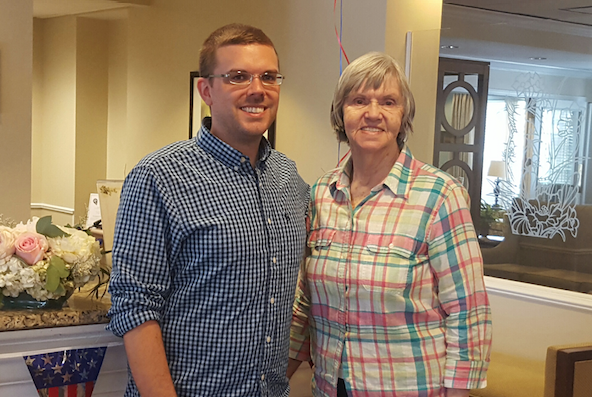Last February, I met one of the nicest people I know. Her name is Marge, and during the past 17 months, I’ve met her nearly a hundred more times. Whenever I visit my Grandma Betty at Brookdale in Edgewood, Marge shakes my hand, introduces herself, and asks my children’s names. Like the other residents of the Crossings at Brookdale, Marge suffers from dementia.
Alzheimer’s is the most common form of dementia, and it is a confusing disease. The medical community has known about it since 1906, yet still hasn’t found a cure. This is odd considering scientists have found cures for diseases such as smallpox and polio in this time. There’s been a lot of research into cures, but so far nothing viable. Medication can, at best, slightly slow the process.
June is Alzheimer’s Awareness Month and it truly deserves increased awareness. More than 5 million Americans suffer from Alzheimer’s. Since 2000, death from Alzheimer’s has risen 89 percent and it is now the sixth leading cause of death in the United States, more than breast cancer and prostate cancer combined.

Like many families, mine didn’t initially realize my grandmother had Alzheimer’s. We just thought she was becoming forgetful with age. It started with losing her keys, forgetting family gatherings, calling us multiple times in a row, forgetting that we just spoke to her. But then she began doing strange things such as unplugging her phone and her refrigerator, leaving food in the microwave for days, and letting junk mail and newspapers pile up in what used to be an immaculate house.
We became worried. What if she fell? Is she taking her medicine? Eating? Bathing? Luckily we were able to transition my grandmother from her house to Brookdale, the nation’s leading provider of Alzheimer’s support. My Grandma Betty is lucky; she set herself up well with her retirement accounts and long-time care insurance. Unfortunately, many of our seniors aren’t so well-equipped.
Quality care at facilities such as Brookdale isn’t cheap – amounting to nearly $50,000 or more a year, depending on level of care. My grandmother’s social security covers only about 15 percent. In 2017, it’s estimated that total costs relating to Alzheimer’s care will be $259 billion.
Some people think I misspeak when I say Medicaid cutbacks will hurt senior citizens. They assume I mean Medicare. But in 2014, before Kentucky’s Medicaid expansion, 10 percent of Medicaid recipients in Kentucky were 65 and older. That’s nearly 80,000 people. Nationwide, 1 in 7 elderly Medicare beneficiaries receive Medicaid.
With pending Medicaid rollbacks proposed by Governor Matt Bevin, this means even basic care could become unaffordable. According to the Alzheimer’s Association, Medicare covers 51 percent of care, Medicaid covers 17 percent, other sources, such as long-term care insurance, cover 11 percent and 22 percent comes out of pocket. That’s $56 billion out-of-pocket, a number that is only going to rise.
Between 2025 and 2035, the number of Kentuckians older than 85 is expected to increase by 30 percent. The AARP notes that older adults rely on “critical Medicaid services, including services for assistance with daily activities such as eating, bathing, dressing, nursing home care, and other benefits such as hearing aids and eyeglasses.”
Cuts to Medicaid put a strain not only on the person needing care, but also their families. More than 1 in 6 working adults in America provide unpaid care to people with Alzheimer’s. The added stress and responsibilities affect their physical and mental health in addition to negatively impacting their jobs.
Amongst working caregivers, 70 percent report suffering work-related difficulties as a result of providing care. This can include unpaid leave, decreasing hours, shifting from full-time to part-time work, turning down a promotion, or just quitting their jobs. Therefore, it’s important that not only the elderly have access to quality healthcare, but so do their caregivers. Medicaid allows working adults to continue to work.
Quality, affordable healthcare is just the start. Kentuckians need fair wages, paid medical and family leave, more paid vacation days, flexible work schedules, as well as other benefits that will improve not only their lives, but the lives of those around them.
We need to protect those who are most vulnerable, as well as the ones taking care of them. For individuals with Alzheimer’s, medical care can be confusing, costly, stressful, and literally a life-or-death matter. While they might forget about you, don’t forget about them.
Josh Blair is an adjunct professor at Northern Kentucky University. He lives in Erlanger.


















Grandma Betty is a role model in planning for retirement. She has both retirement accounts and long-term care insurance, which can help pay for expenses in taking care of someone with Alzheimer’s.
According to a recent study, an estimated $259 billion is the direct costs to Americans when taking care of someone with Alzheimer’s or Dementia. This is a huge number and only shows that people should really prepare for this need as early as possible. Getting long term care insurance is the best decision anyone could make because according to AARP and ALTCP.org, this insurance product helps pay for different types of long term facilities and services. Since the cost of care continues to increase, it is really wise to get covered.